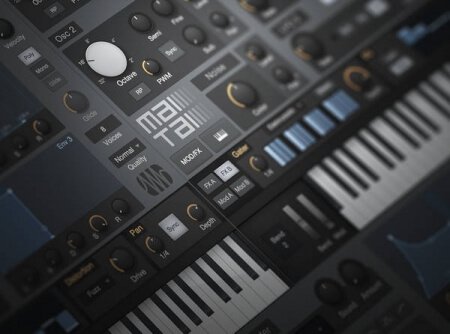Groove3 Studio One Mai Tai Explained [TUTORiAL]

P2P | 23 December 2022 | 169.68 MB
If you use Studio One as your DAW, you have an incredibly powerful analog-modeling synthesizer available to you called Mai Tai. In this Mail Tai video tutorial course, virtual instrument guru Larry Holcombe teaches you all of its features and functions, plus how to coax all kinds of inspiring and exciting tones from this sonic tour de force. After completing this comprehensive course, you may begin to wonder whether you need to invest in any other soft synths at all! This video is for new users of Mai Tai.
Larry begins by covering the various areas of the interface, so you have a good idea of how the instrument is laid out and organized. Then it's on to the oscillators - the heart of any synthesizer. You'll learn about the various waveforms available and other parameters, all of which allow you to construct a huge range of tones that can then be further sculpted to your liking. Discover how the noise generator allows you to imbue your sounds with various levels of electronic noise. This is useful for creating various percussion sounds and adding texture and complexity to pitched sounds as well.
Next, explore the Character module, allowing us to color our sounds in different ways, including adding analog-style warmth, saturation, vowel-type formant sounds, and harmonic excitation. Larry then covers the filter, where you'll learn how its many parameters (cutoff, resonance, drive, punch) affect the sound in dramatic fashion.
Many more topics are covered as well, including the LFO section (for adding various modulations), envelopes (adding movement and modulation), global settings (output volume, velocity sensitivity, glide time, etc.), effects section (seven different effects), mod matrix (creating modulation with an additional controller, such as an expression pedal), and more! You'll finish the course by watching Larry create six different useful sounds from scratch: analog kick drum, analog snare, analog hi-hat, 80s bass, big pad, and a "ravey" lead.
Before you spend your money on that shiny-new virtual synth (or hardware model, for that matter), you owe it to yourself to see what Mai Tai is capable of. With this Mai Tai course, you'll hear exactly what can be done with this included virtual instrument for Studio One, and you'll also learn how to make it do your sonic bidding. See the descriptions of each Studio One Mai Tai video tutorial for more information on the contents and also ideas on how you can make this synth work for you in your own productions. Learn the power of this flexible instrument once and for all... watch "Studio One Mai Tai Explained®" now!
home page
Larry begins by covering the various areas of the interface, so you have a good idea of how the instrument is laid out and organized. Then it's on to the oscillators - the heart of any synthesizer. You'll learn about the various waveforms available and other parameters, all of which allow you to construct a huge range of tones that can then be further sculpted to your liking. Discover how the noise generator allows you to imbue your sounds with various levels of electronic noise. This is useful for creating various percussion sounds and adding texture and complexity to pitched sounds as well.
Next, explore the Character module, allowing us to color our sounds in different ways, including adding analog-style warmth, saturation, vowel-type formant sounds, and harmonic excitation. Larry then covers the filter, where you'll learn how its many parameters (cutoff, resonance, drive, punch) affect the sound in dramatic fashion.
Many more topics are covered as well, including the LFO section (for adding various modulations), envelopes (adding movement and modulation), global settings (output volume, velocity sensitivity, glide time, etc.), effects section (seven different effects), mod matrix (creating modulation with an additional controller, such as an expression pedal), and more! You'll finish the course by watching Larry create six different useful sounds from scratch: analog kick drum, analog snare, analog hi-hat, 80s bass, big pad, and a "ravey" lead.
Before you spend your money on that shiny-new virtual synth (or hardware model, for that matter), you owe it to yourself to see what Mai Tai is capable of. With this Mai Tai course, you'll hear exactly what can be done with this included virtual instrument for Studio One, and you'll also learn how to make it do your sonic bidding. See the descriptions of each Studio One Mai Tai video tutorial for more information on the contents and also ideas on how you can make this synth work for you in your own productions. Learn the power of this flexible instrument once and for all... watch "Studio One Mai Tai Explained®" now!
home page
Only registered users can see Download Links. Please or login.


No comments yet